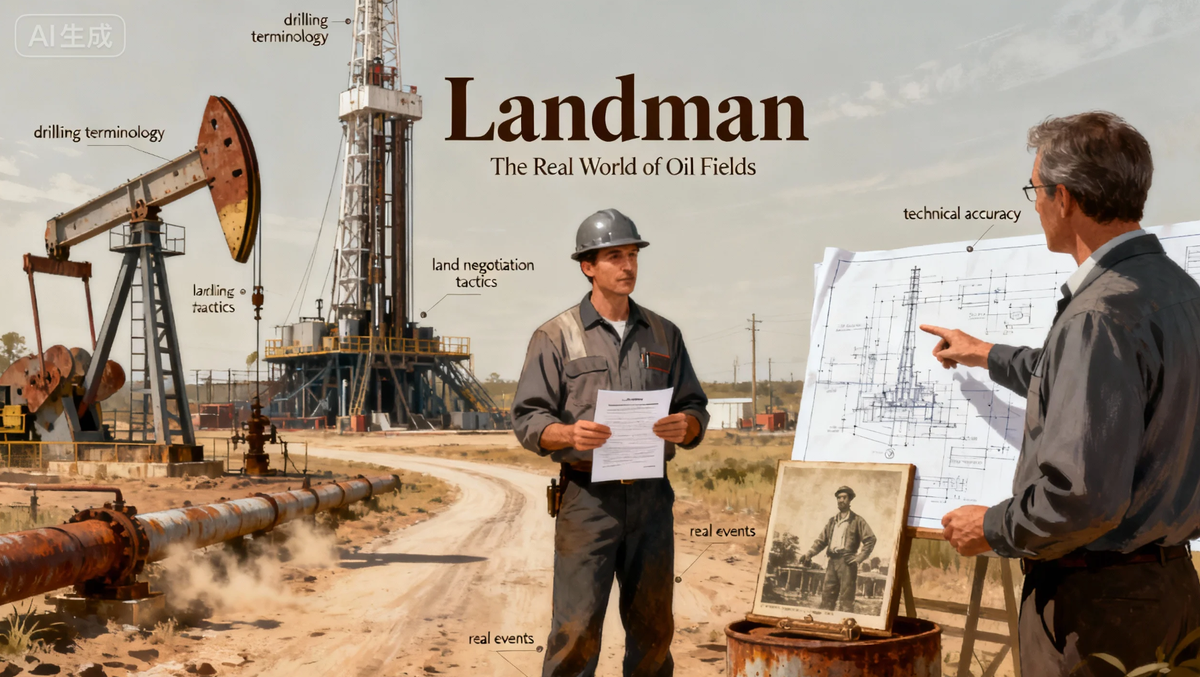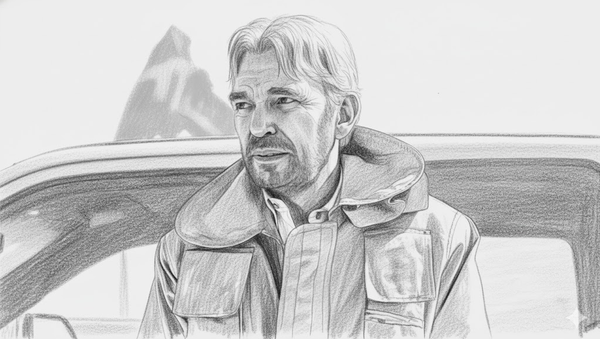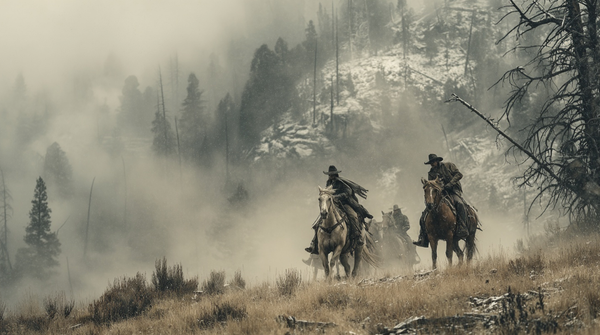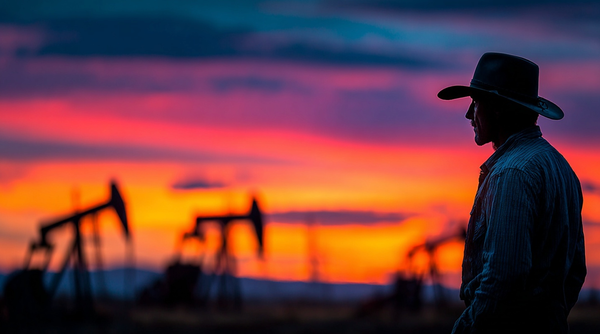How Landman gets the oil industry right: An insider's perspective

From drilling terminology to land negotiation tactics, Taylor Sheridan's Landman captures the authentic reality of America's oil fields with unprecedented fidelity for mainstream television. What distinguishes this series from previous oil industry dramas is not merely its dramatic flair but its commitment to technical accuracy and ground-level realism. By partnering with industry experts, drawing inspiration from documented real events, and embedding actual oil field practices into every narrative thread, Landman has achieved something remarkable: a television drama that serves simultaneously as an inadvertent educational tool about how the petroleum business actually operates.
The Foundation: Built on Real-World Research
The genesis of Landman's authenticity lies in its foundation. The series is not conjured from Hollywood imagination but rather emerges from Boomtown, a rigorously researched podcast produced by Texas Monthly and hosted by Christian Wallace, a former roughneck who spent a year working on drilling rigs in the Permian Basin. Wallace's firsthand experience in the oil fields, combined with his work as a Texas Monthly journalist investigating the region's oil boom, provides the series with an insider's perspective rarely found in mainstream entertainment.
When Taylor Sheridan began developing the show, he didn't rely solely on Wallace's insights. Instead, Paramount Pictures enlisted Marshall Watson, the chair of the petroleum engineering department at Texas Tech University and an SPE member with 23 years of oil and gas industry experience, as a technical consultant. Watson conducted "Oilfield 101" training sessions for the production crew and organized field visits to operational drilling sites near Lubbock, Texas. He subsequently served as an on-set advisor in Fort Worth, delivering presentations to help producers and actors understand realistic industry scenarios. This institutional support distinguishes Landman from typical Hollywood productions that rely on surface-level research.
As Christian Wallace explained when discussing the show's accuracy: "A lot of it is very accurate. Some of it we had to kind of squeeze together to make it make sense for our characters. And it's funny, it depends on who you ask. My uncle who works in the oil field for the last 30 years will nitpick every little thing. But I think for the most part, it's safe to say you get a decent sense of what it's like working in oil and gas out there".
The Technical Lexicon: Speaking Oil Industry Language
Landman demonstrates meticulous attention to terminology and technical procedures that would mystify viewers unfamiliar with the industry yet resonate with authentic accuracy for those who work in it. The series incorporates genuine drilling terminology, equipment names, and operational sequences that reflect actual oilfield practices.
When Tommy Norris discusses title work in the show's opening scenes, viewers unfamiliar with oil and gas operations might overlook the accuracy of these discussions. Yet the depiction of tracing ownership chains—examining mineral rights, surface rights, and the complex legal history determining who owns what beneath the earth—reflects the actual work performed by landmen. In one particularly authentic scene, Tommy explains to a defiant landowner: "You own the surface, which you purchased from Daniel Pearsall. And Daniel Pearsall's father sold the mineral rights in 1993 to The Permian Basin Trust, who subcontracted the rights to Meridian Oil, which was bought by ConocoPhillips and sold to M-Tex oil". This exposition, while potentially tedious to casual viewers, accurately represents the labyrinthine title searches that occupy significant portions of actual landmen's careers.
The portrayal of mineral versus surface rights—a distinction many viewers encountering the show for the first time might find confusing—reflects genuine legal realities. In much of Texas and the American West, mineral rights and surface rights are severed; a property owner might possess the surface but not the minerals beneath it, and these rights can be further subdivided and transferred across generations. This complexity, often causing years of legal disputes and negotiation, is what sustains the landman profession.
The series also accurately represents the technical hazards of drilling. The catastrophic well blowout depicted in early episodes—resulting in explosions, fires, and worker deaths—reflects genuine industry dangers. According to OSHA data, blowouts represent "one of the most feared incidents in oil and gas drilling" and occur when control over wellbore pressure is lost, leading to uncontrolled release of crude oil and natural gas. While the show dramatizes these incidents for narrative impact, the underlying technical mechanisms depicted are authentic.
The Landman's World: Negotiations and Tactics
One of Landman's greatest achievements is illuminating the actual work of landmen—a profession most Americans have never heard of and fewer still understand. The series demonstrates that landmen function simultaneously as researchers, negotiators, salespeople, and legal specialists. Tommy Norris's work encompasses precisely this multidisciplinary reality: he traces property ownership through courthouse documents, negotiates leases with landowners, calculates economically viable terms for mineral acquisition, and orchestrates surface access agreements allowing drilling operations.
The show captures several authentic negotiation scenarios. Landmen in reality must research federal, state, and local laws regarding property ownership and mineral rights before approaching landowners. They must understand the extent of their company's authorization to negotiate and possess authority to commit significant capital to lease acquisitions. The depicted negotiations—where Tommy must balance company interests against landowner concerns while remaining diplomatically persuasive—reflect genuine interplay between these stakeholders.
What particularly distinguishes the show is its portrayal of the financial dimensions landmen manage. Lease bonuses (upfront payments per acre) and ongoing royalty payments (calculated as percentages of production revenue) are negotiated and calculated with mathematical precision. A landowner receiving a 1/16th royalty on oil selling at $60 per barrel would receive $3.75 per barrel extracted from their property. These financial arrangements, depicted accurately in the series, represent the actual compensation structures that make landmen's work economically significant.
The Permian Basin: Culture and Commerce
The series authentically captures the culture of West Texas oil country and specifically the Permian Basin, the world's most productive oilfield. The show's setting in and around Midland reflects genuine geography and culture. Midland, located in West Texas's Permian Basin, has become one of the largest oil producers in the United States, and the oil industry is deeply intertwined with residents' daily lives. The show's depiction of oil infrastructure—wells visible in residential neighborhoods, the pervasive presence of energy commerce in community consciousness—accurately mirrors actual Midland.
The series also captures real economic transformations occurring in the region. The oil boom has triggered housing shortages, influxes of workers seeking employment, and wage inflation across multiple sectors. The demographic shift from rural community to boom town—with accompanying social disruption—forms the backdrop of Landman's narrative. Similarly, the portrayal of roughneck compensation reflects reality: workers earn substantial salaries (the show suggests over $180,000 annually, with reality ranging from $100,000 to $194,584 depending on experience), reflecting the dangerous and demanding nature of the work.
The show's depiction of roughneck life—the camaraderie, the hazing of new workers, the genuine friendships formed among crews—emerges authentically from the podcast's interviews with actual oilfield workers. Boomtown host Christian Wallace interviewed roughnecks about the dangers of their work, creating narratives that informed the series' portrayal of both the appeal and the terror of working on drilling rigs.
Where Fiction Complements Fact
While Landman demonstrates remarkable authenticity in its technical details and cultural representation, the series necessarily employs dramatic license in several domains. The cartel violence depicted in the show reflects exaggeration for narrative purposes. According to oil industry professionals discussing the show online, while drug cartels do operate in border regions, the frequency and brazenness of their confrontations with oil companies, as depicted in the series, represents dramatization rather than routine reality. In practice, cartel activity remains largely invisible to most oilfield operations, and companies encountering such activity typically report it to authorities rather than engage in the dramatic confrontations depicted in the show.
Similarly, while Landman accurately portrays various genuine workplace hazards and safety challenges in the oil industry—falls, electrical hazards, confined space dangers, and lack of proper protective equipment—the frequency and severity of accidents depicted may exceed typical modern operations. Industry professionals note that contemporary safety standards and regulatory oversight have substantially improved working conditions compared to historical periods. One Chevron land manager observed: "It was shocking to see those scenes. In my view, it evokes a time long past when conditions were truly hazardous. The industry has advanced significantly since then".
The show also dramatizes certain title and ownership complexities. While the underlying legal principles are authentic, the particular complications and obstacles depicted are often compressed or exaggerated for narrative momentum. Real landmen might spend months or years resolving title issues that the show condenses into single dramatic scenes.
The Real Stories Behind Fiction
Several specific narrative elements in Landman draw directly from authentic events documented in the Boomtown podcast or real oil industry incidents. The plane collision with an oil tanker on a roadway that initiates the series' action—while seeming improbably dramatic—is inspired by real events, as Wallace acknowledged. Similarly, the catastrophic rig explosion killing multiple workers draws inspiration from documented incidents, including real stories of multiple family members perishing together in single accidents.
The portrayal of workplace accidents reflects genuine safety statistics. Between 2014 and 2019, almost 219 deaths of roughnecks were reported in Texas oilfields alone, with vehicle crashes and collisions with objects as common causes. The series' depiction of these tragedies, while dramatized, grounds itself in statistical reality. When Tommy convinces his boss Monty Miller to provide $250,000 bereavement gifts to the families of deceased workers, the show reflects genuine ethical complexities around corporate responsibility and worker treatment.
The Authentic Dialogue: Reflecting Industry Culture
Tommy Norris's sardonic, profane dialogue—delivered with Billy Bob Thornton's perfect deadpan timing—reflects genuine oil patch vernacular and communication styles. The crude humor, blunt negotiations, and casual profanity depicted in the show mirror actual oilfield communication, where informal speech patterns and dark humor serve both as bonding mechanisms and defensive responses to dangerous working conditions.
When Tommy delivers his monologues about renewable energy dependency on fossil fuels and oil infrastructure's indispensability to modern life, the substantive arguments presented emerge from actual industry talking points rooted in technical reality. Whether one agrees with these perspectives, they represent arguments genuinely made by oil industry professionals and grounded in accurate observations about global energy infrastructure. A Texas Tech professor helping train production staff noted: "He truly captured the essence of the industry voice," suggesting that even controversial speeches reflect authentic industry perspective.
Where Modern Industry Differs From the Series
Industry professionals acknowledge that Landman, while substantially accurate, compresses the industry's regulatory environment and safety consciousness. In reality, companies employ extensive health and safety departments, conduct mandatory training programs, maintain compliance tracking systems, and prioritize adherence to federal OSHA regulations. Over the past decade, OSHA has cited oil and gas companies for over 10,000 safety violations—a significant number, yet representing a fraction of total operations across thousands of companies and hundreds of thousands of workers.
The show's portrayal of casual safety negligence—workers lacking proper protective equipment, inadequate supervision of dangerous operations, insufficient training—represents dramatization of real safety challenges rather than contemporary standard practice. Modern oil companies recognize that maintaining operational licenses and avoiding catastrophic liability requires prioritizing worker safety alongside production goals.
The Bottom Line: Authenticity as Achievement
What distinguishes Landman in the landscape of oil industry representation is its commitment to getting the fundamentals right. Rather than reducing the industry to caricature or simplified narratives, the show demonstrates that dramatic storytelling and technical accuracy need not be mutually exclusive. The series educates viewers about unfamiliar professions, complex legal frameworks, and genuine economic realities while simultaneously delivering compelling drama.
For those working in oil and gas, Landman offers recognition—however dramatized—of their actual labor, risks, and expertise. For general audiences, it provides unprecedented access to a world most never encounter. As one oil industry analyst noted: "Compared to the caricatures and lackluster storylines of earlier series loosely based on the oil industry, like 'Dallas,' the gritty realism found in 'Landman' emerges as a distinctive and captivating achievement".
The show's success in balancing authenticity with drama demonstrates that respect for source material and technical accuracy enhance rather than diminish entertainment value. By grounding the series in documented reality, consulting with genuine experts, and honoring the actual complexities of oil industry operations, Landman has achieved something increasingly rare in mainstream television: drama that educates, entertains, and enlightens simultaneously.



